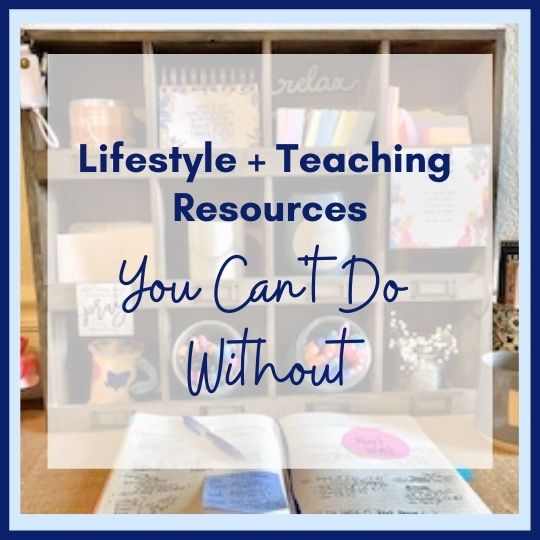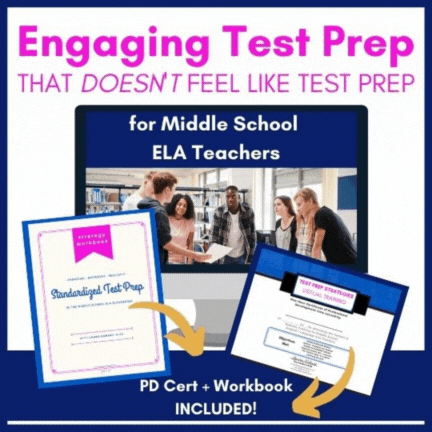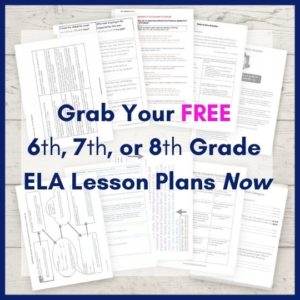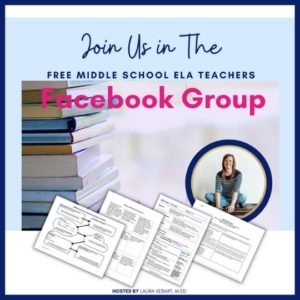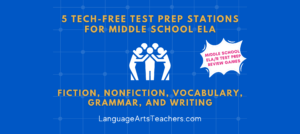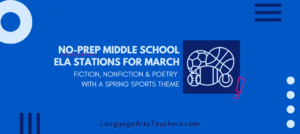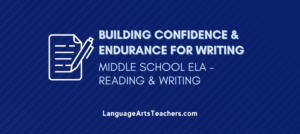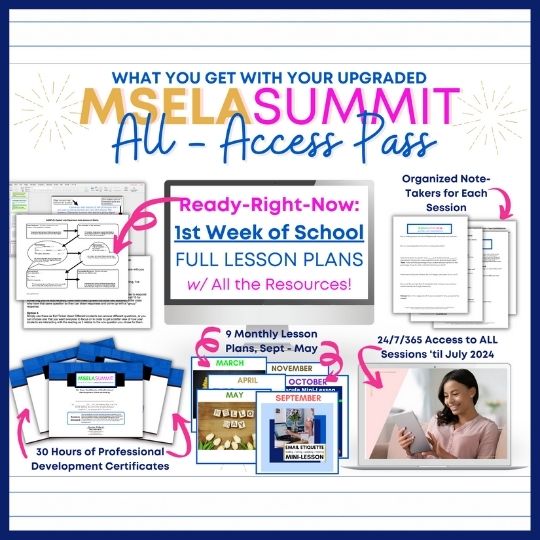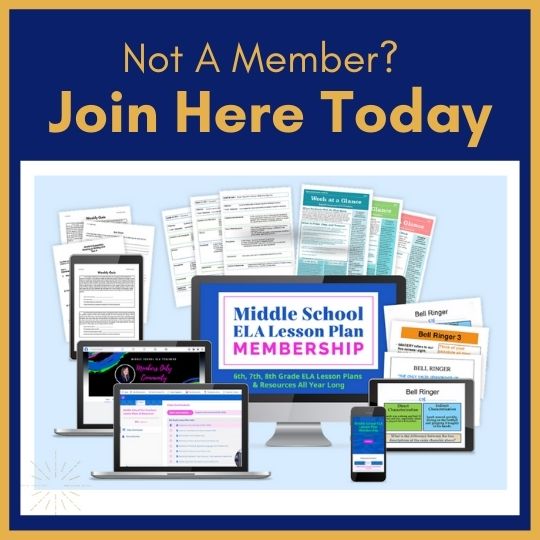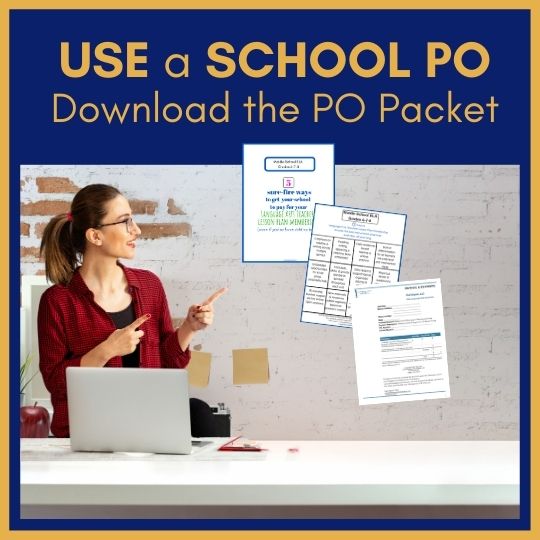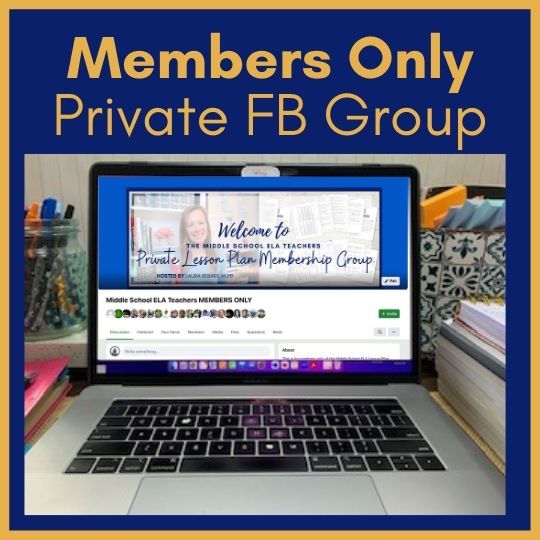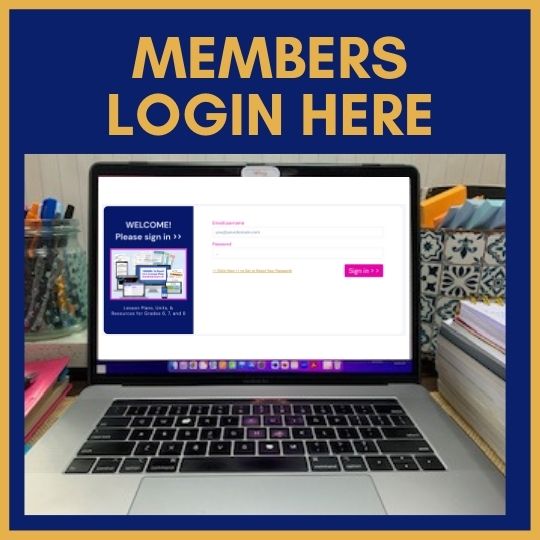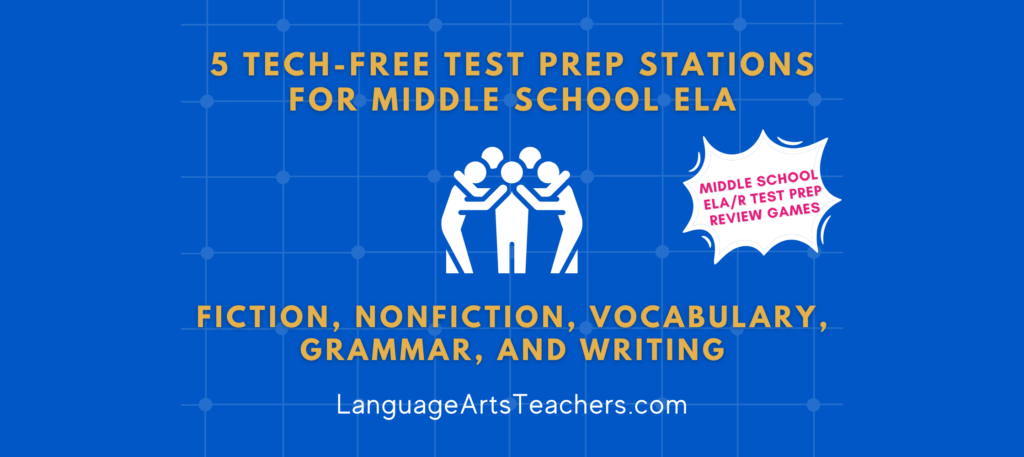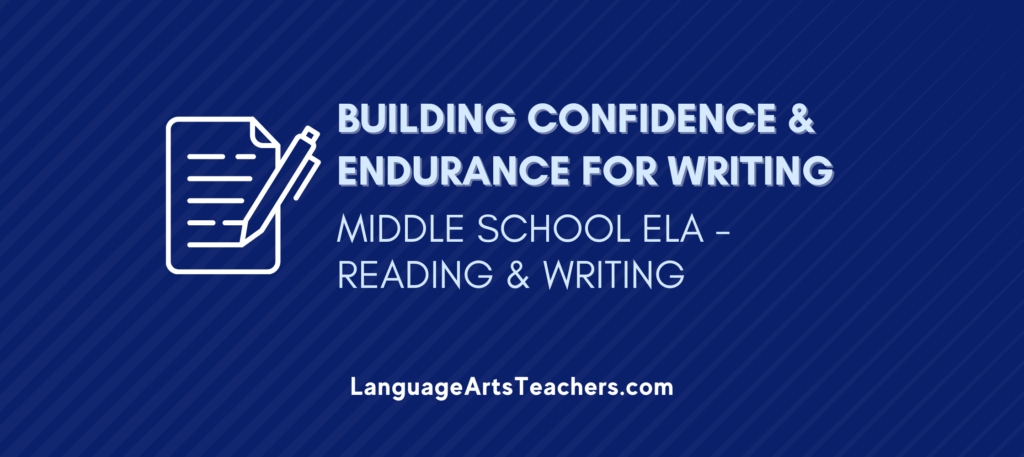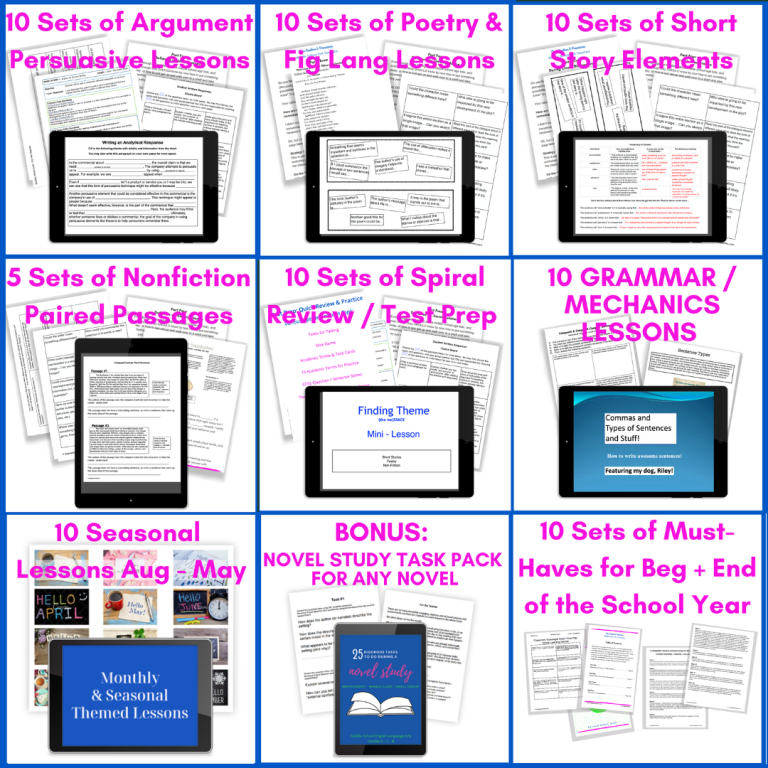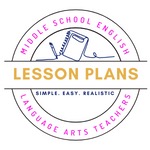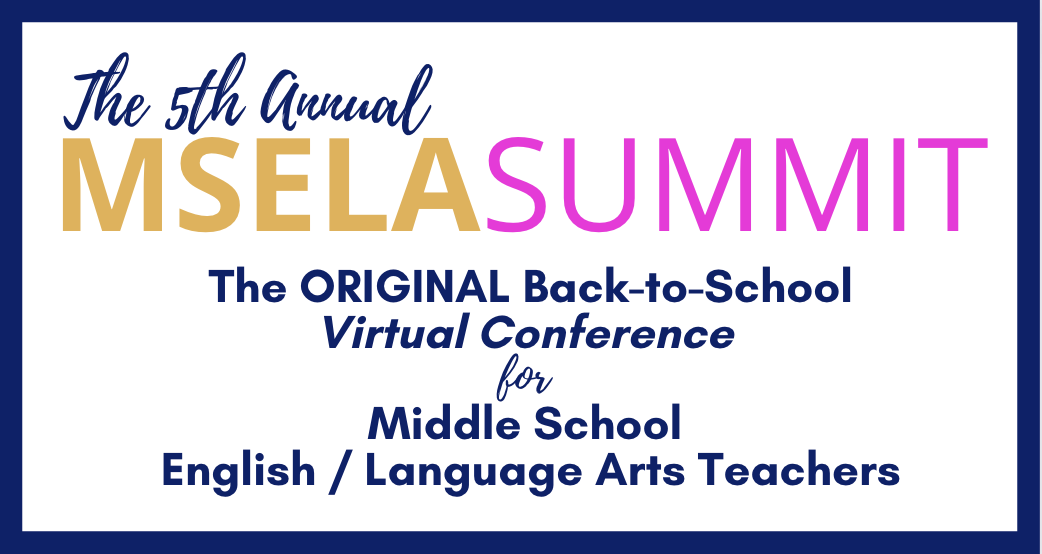What to Teach Your First Day of Class
Planning your first day of class–whether you’re a seasoned teacher looking for a change or a teacher new to the middle school ELA classroom–is laid out right here for you!
Whether you have a 45 minute class or a 90 minute block schedule, knowing what you will do for that first day of school relieves so much pressure and anxiety. Plus, if you teach multiple grade levels (as in, you ARE the entire ELA department at your school), then using the exact same plan for all your classes will bring peace, organization, and simplicity to what is typically a hectic yet exciting day.
Here we go:
The First Day of Middle School English Language Arts
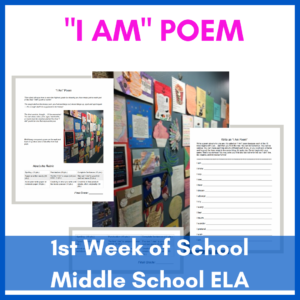
Activity 1: The “I Am” Poem
I have a print out of my “I Am” Poem template (complete with sentence starters) laying on students’ desks as they first enter the room. My instructions are posted on the projection board and simply state that students are to begin filling out the “I Am” Poem.
Rationale: With inevitable disruptions on the first day (i.e. extended announcements over the PA system, or students who went to the wrong class, or office staff popping in to ask questions that can’t wait), allow some self-directed time for students to begin working on something right away that doesn’t involve you. Also, you can move around the room to double-check schedules or to collect or pass out any forms or other housekeeping information that needs to be done. Plus, this set up allows my students literally from Day 1 to see that there will always be a little something for them to do the moment they walk in the door (no time is wasted, and they don’t need to sit around waiting for me to “start” class).
Join the Middle School ELA 1st Week Lesson Plan Workshop to get ALL the resources and materials I’m talking about here!
It’s Free!
In just 15 minutes a day, for 5 days, you’ll have your ENTIRE 1st week of plans DONE along with all the lessons you’ll be using.
Activity 2: Next, use “get to know you” questions as informal ice-breakers so students have a chance to begin talking with each other in a productive way. This is especially helpful for students who are new to middle school having come up from elementary, or who are new to the area. It’s a way to help everyone feel included right away. Students will complete the “get to know you” ice-breakers in small groups or pairs using task cards that contain the questions or prompts. I have 100 of these I’m ready to share with you for free when you join my (also free!)
Rationale: This small group “get to know you” ice breaker activity allows students to go ahead and begin practicing listening and responding skills. This is also where you can embed teaching your expectations for discussions and interactions. Model with students what “group talk” looks like and sounds like (voice volume), using the get to know you questions as a means through which they practice and model those expectations.
I’m sharing my collection of 100 non-cheesy “get to know you” questions as task cards in my next round of the 1st Week Lesson Plan Workshop I’m running. It’s a FREE event, and everyone who joins me will walk away with a solid, engaging first week of lessons for Middle School ELA!
Join the Middle School ELA 1st Week Lesson Plan Workshop to get ALL the resources and materials I’m talking about here!
It’s Free!
In just 15 minutes a day, for 5 days, you’ll have your ENTIRE 1st week of plans DONE along with all the lessons you’ll be using.
Activity 3: Syllabus Scavenger Hunt
How boring for you as a teacher AND for your students to have to read through the syllabus in every class, all throughout the day. They won’t remember the details, and you’ll be hoarse from all the talking and reading you’ll have to do all day long.
Instead, meet the school’s requirement that you “do the syllabus” by having students work together (small groups or pairs) to locate specific items you really want them to search for. In searching, they’ll interact with the syllabus much longer, and with significantly more intention, than if you read it to them or left them to read it themselves (which they won’t).
Rationale: The scavenger hunt process is interactive for your students, and actually gets them reading an informational nonfiction text right away! When it’s time to go over the “answers” or to check for understanding, you can use those moments to follow up, clarify, or further explain any nuances in your syllabus.
Wondering what to put in your syllabus?
How long should it be?
What details to include or not include?
I’m sharing several syllabus templates I have used for Middle School ELA that you’re welcome to use, too! You’ll get to see what’s in them, what’s not in them (and why), along with the design and style or layout of the options. Get them as part of the 1st Week Lesson Plan Workshop I’m running soon!
Join the Middle School ELA 1st Week Lesson Plan Workshop to get ALL the resources and materials I’m talking about here!
It’s Free!
In just 15 minutes a day, for 5 days, you’ll have your ENTIRE 1st week of plans DONE along with all the lessons you’ll be using.
Activity 4: First Day of School Mentor Text
We all have those first day of school memories—even our students! Share in the experience while also fostering a love for reading when you share an excerpt from a novel about a fictional character’s first day of school. I’ve done this with both high school and middle school students—and it’s always a hit! They want me to keep reading (that’s a win, for sure!).
With this activity, I don’t ask my students to do anything but listen. I take an excerpt from a novel like Just Like That by Gary D. Schmidt or El Deafo by Cece Bell and I read a few pages aloud to the class.
This works well as a “beginning of class” read-aloud for the rest of the week, pulling a different excerpt from a different “first day of school” novel each day of the week. I don’t recommend this as the very first activity on the very first day itself just because of all the unintended interruptions that occur (the ones I mentioned earlier in this article, which are so typical and often can’t be helped on the first day of school).
Rationale: Students are never too old to be read to. They need fluency more than ever! That means they need to experience what good reading sounds like. Plus, it provides a common experience for everyone in your class. It becomes something “we all did together” that first week which we can refer back to collectively. Finally, when it comes to students needing to choose a novel for their personal reading later on, many of them will recall (and ask for!) one of the books from the first day of school read-alouds.
I’m sharing my whole first day of school read-aloud book list (with page numbers and specific excerpts I personally love and recommend) inside the 1st Week Lesson Plan Workshop I’m running soon!
Join the Middle School ELA 1st Week Lesson Plan Workshop to get ALL the resources and materials I’m talking about here!
It’s Free!
In just 15 minutes a day, for 5 days, you’ll have your ENTIRE 1st week of plans DONE along with all the lessons you’ll be using.


